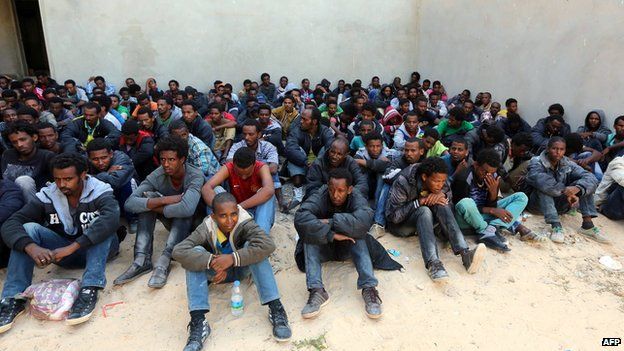Migrant crisis: Who are Africa's people smugglers?
- Published

European countries are scrambling to stop record numbers of migrants drowning in the Mediterranean Sea, but who are the men sending them on perilous journeys?
Human traffickers are the key link that European officials wish to target. But they are taking on complex criminal networks that do not recognise borders and which experts liken to "multinational corporations".
"What we have seen over the last two years is a growing degree of professionalisation," said Tuesday Reitano - the head of the Global Initiative Secretariat - who has researched the traffickers.
"What were once very informal ad-hoc networks, moving people from place to place, are now offering a higher range of services including document fraud."
Ms Reitano said for the first time "real kingpins" were operating across Sub-Saharan Africa, offering migrants passage all the way from the west coast, on to Libya and across to Europe.
Giampaolo Muscemi spent two years travelling with traffickers across the world as he co-wrote the ebook Confessions of a People Smuggler.
He met one Egyptian smuggler who has developed a huge network in Libya over 15 years running boats to Italy. The smuggler insisted that was in his interest to provide safe passage.
His message, Mr Muscemi told the BBC, was: "I don't want my clients to die, because my work is based upon my reputation. At the beginning of my career I was searching for clients, now that I am a big smuggler people come to me because of my reputation for safety."
Business is clearly booming. A record 35,000 migrants have already travelled to Europe this year. Mr Muscemi estimates that Mediterranean trafficking is worth between €300-600m ($644m; £430m) a year, and this is encouraging amateurs to take over.
"In Libya, the clients are too many, they don't have any choice but to put their lives in the hands of the smugglers," he said.
"So the smugglers can decrease the quality of the service. They don't have to preserve their reputation."
'If you don't board they will shoot'
Since the 1980s Libya has attracted economic migrants from across Africa, but their role has now changed.
Europe's border agency Frontex says that many of the original migrants have now become "recruiters, liaising between the Libyan-controlled criminal gangs and would-be migrants".
Once in the country, migrants are often forced to hand over their money and passports, leaving them at the mercy of the traffickers. Ali from The Gambia was forced to board an unsafe boat.
"The Libyan man lied to us," he told the BBC. "He said it was a big boat. We all paid 1,000 dinar (£488, $728). When we got to the boat, he forced us to enter with a gun, if you don't enter he will shoot you."
The exodus of migrants from Syria has further empowered the traffickers, according to Ms Reitano.
"The Syrian migration flow changed the game as far as human smuggling was concerned in Sub-Saharan Africa, because the Syrians had more money to pay.
"They were ready to put down several thousand dollars at a time, whereas the African migrants could never pay more than $200 or $300. Those groups that could respond to that need began to profit very quickly and they were making millions of dollars."
The BBC's Rana Jawad reports on the desperate plight of migrants from Libya
Libyan authorities rarely stop traffickers, with Tripoli's coastguard admitting to the BBC they cannot handle the volume of boats and they will only interfere if a boat runs into trouble.
Much of Libya is beyond government control and it is believed that local militias are often active partners with the smugglers.
The Italian newspaper La Repubblica has published what it says is an Italian police recording of a Tripoli-based smuggler's phone calls.
Eritrean Mered Medhanie claimed to have sent 8,000 migrants on Italy-bound vessels, in a conversation with another smuggler intercepted by police.
"I always let too many on board, but it is them [the migrants] who want to leave as soon as possible," he reportedly said.
Getting richer
Mr Mescumi says one common misconception is to think of the smugglers as boat pilots or fishermen.
"They are clever. Think of a smuggler as someone who never sleeps and spends 24 hours a day thinking about how to break into Europe. They read newspapers, study European laws, study what Frontex are doing - they will probably even read this piece."
He believes that the desperation of migrants allied with the profits that smugglers stand to make means it has become an intractable problem.
"When governments shut routes the business just becomes richer, because the journey is longer and more dangerous. You can't stop it, you just have to manage it."
Ms Reitano says in order to clamp down on traffickers, governments must focus their efforts on seeking out the people at the heart of the problem.
"If they want to be more successful they have to use more sophisticated techniques. They need to start looking for suspicious money laundering transactions, following the money behind this and looking for the controllers."